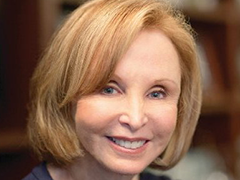Teaching Guide for Women Inspired Program
Background
In today’s world, highly talented women continue to face challenges that limit their success, career potential and general life satisfaction. In partnership with the GSB Women's Task Force, the GSB Alumni Relations Office makes these resources available to spark thinking and discussion on important topics of career navigation, leadership through awkward dynamics in the work place, work-life balance, and diversity.
These resources are designed to challenge you to grapple with the forces driving your own internal compass and gut reactions as you watch, discuss, and share a combination of both the Capstone Perspectives and Video Case Vignettes.
Women Inspired Program Vignettes
This content is designed from real stories and perspectives of diverse women with the simple assumption that career satisfaction and life success are driven by the ability of a woman to make consistent value judgments and decisions that are driven by an inspired perspective of oneself and ones life vision. The vignettes and cases are structured to spark personal reflection around one's own values and decision-making process, which will lead to transformative learning of practical ways to address challenges. The video case resources are made available to all alumni and the content is designed to be experienced individually, in a group discussion or with a professional coach.
The collection includes two different types of videos: Capstone Perspectives and Video Case Vignettes. The Capstone Perspectives feature a woman’s perspective, experience or advice on a particular topic or theme. The Video Case Vignettes focus on a particular challenge a woman faced, decisions she made, and what she learned from the experience.
Video Case Vignette Format
These case vignettes feature leaders who share their experiences and insights to help you understand the opportunities you have to hone your own thinking and career design. The case vignettes are broken into 3 clips: the background and challenge; the decision or action taken by the leader and the results of the case with lessons learned. At the end of each clip, take time to consider or discuss how you might handle the dilemma, whether or not you agree with the action that was taken, or what you might do differently and why. Take heed of the lessons learned and see what advice you can take from leaders who have gleaned important insights from their experiences.
How to Make the Most from the Video Vignettes
Try to watch a combination of Capstone Perspectives and Video Case Vignettes from different leaders. In many cases, you will see that leaders may handle the same question or challenge very differently. Consider which approach or perspective works for you.
As you watch the videos, reference the scrolling notes next to the video, which includes a brief background on the leader, a summary of the vignette, take-aways, and questions to consider. For every vignette, ask yourself whether or not you agree with the leader. Try to understand what values or frameworks are driving your reactions. If you have not yet faced a similar challenge, consider how you might use the challenge to prepare for what may lie ahead. You may also recall a very different challenge you have faced that brings you to a similar conclusion as the challenge in the video.
As the leader shares her challenge, imagine yourself in her shoes and how you would handle the situation. Pause the video to consider and/or discuss the challenge, how it is handled, and the lessons learned. Think about what you might do differently or what was done well. Use these stories and insights to consider the values and decision making processes that drive your own internal compass.
Take time to reflect on your own situation, goals, values, plans and future.
After you watch the video, ask yourself the simple question:
What will you continue doing? Start doing? Stop doing?
Additional Readings and Resources
Video Vignette: Ask Why Not
Featuring: Katherine Auguste-deWilde
Background on Leader: Katherine was President and Chief Operating Officer of First Republic Bank. Prior to joining First Republic, she was Senior Vice President and Chief Financial Officer of PMI Group. Katherine is involved in a significant number of philanthropic organizations to include the Stanford University Graduate School Business Advisory Council, Vice Chair of the Board of Trustees of Town School for Boys; Board of Trustees for the Carnegie Foundation for the Advancement of Teaching; the Policy Advisory Board of the Center for Real Estate and Urban Economics, University of California, Berkeley; and has served as board member and Vice Chair of the San Francisco Zoological Society. August-deWilde has a Bachelor of Arts degree from Goucher College in Maryland and an MBA from Stanford University. She is married with children.
Summary: Katherine urges you to push back on basic assumptions and fight for what you want.
Takeaway: Do not assume there is no flexibility and remember to push back.
Considerations and Questions:
1- Do you have specific goals in mind that keep you focused?
2- What can you do to position yourself for success?
3- How can you overcome obstacles you see in your life?



